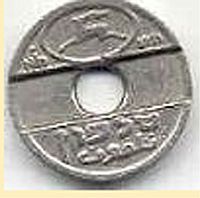The afikoman אפיקומן is perhaps the most misunderstood part of the seder meal. The Mishna in Pesachim (10:8) states:
ואין מפטירין אחר הפסח אפיקומן
Which can be loosely translated as "After the Pesach (sacrifice) one should not end with afikoman". To this there are two major questions. One, what is this afikoman? And two, isn't the afikoman actually the last thing we eat at the seder?
First, let's find out what afikoman means. While there are a number of midrashim and folk-etymologies, the most commonly accepted answer is that it comes from the Greek word epikomion, meaning the "festal procession after the meal". Epi means "after" (as in epilogue), and komos means "banquet, merrymaking" (and is the root of the word "comedy").
Professor Eliezer Segal explains here the development of this understanding of afikoman:
The reference is to a custom known as epikomion, a Greek word meaning "after dinner revelry" ... Normally this would involve going off to someone else's house, whether or not you have been invited, and indulging in another party.
What the Mishnah is saying is that, in spite of some of the apparent similarities between the seder and a pagan banquet, one should not treat it light-headedly as the Romans and Greeks would their own feasts. This meaning was understood by the Rabbis of the Palestinian Talmud, who lived under Roman rule. By contrast, the Babylonian Talmud (whose authors lived farther away from the Greco-Roman world) came to understand the afikoman as a "dessert," translating the Mishnah as "One should not eat anything after the Passover Afikoman."
So now the question remains, even if we accept the Babylonian Talmud's understanding that we are not supposed to eat after the afikoman, why do we call the last piece of matza we eat "the afikoman"?
It was accepted by most halachic authorities that in order to fulfill the intention of the above mishna, the last thing eaten at the seder should be a quantity of matza. In the times of the Geonim, there was no mention that this piece needed to come from the broken and hidden piece of the middle matza. But by the time of the Rishonim (Rashi, Rashbam and others), it was emphasized that the last piece of matza eaten should come from the broken and hidden piece. This is the origin of the siman (step) tzafun צפון - meaning "hidden".
Then, starting in the time of the Rishonim (Machzor Vitri, Sefer Rokeach, and others), the afikoman began to refer to the piece of matza eaten during tzafun.
So the meaning afikoman changed from a forbidden act of revelry, to a dessert, to a required piece of matza during the meal. Anyone who could have guessed that really deserves an "afikoman present"...



